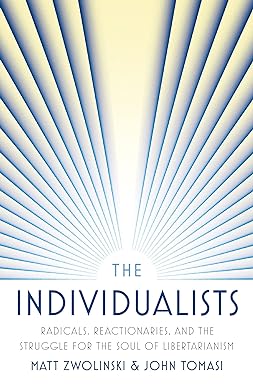
A really excellent book, obtained via the wonderful Interlibrary Loan service of the University Near Here library. All the way from Kansas State!
The authors, Matt Zwolinski and John Tomasi, are self-described "bleeding-heart libertarians". In fact, they were major contributors to the same-named website, which was founded in 2011, and continued until 2020, when they decided they had said everything they needed to say.
The book is an "intellectual history" of libertarianism, dealing with the origins, development, and current state of the ideology. Or rather: the various tribes and factions that comprise something that is far from a unified philosophy. Libertarians love to point out the evils of statism; they also love pointing out the evils of other libertarians. (The episode where Ludwig von Mises declared "You're all a bunch of socialists" before stomping out of a meeting of the freakin' Mont Pelerin Society is recounted.)
Rest assured: despite being firmly in a subset of the big (circus) tent that is libertarianism, the authors treat the other members fairly, even while making clear their personal dissents.
But even given the internecine squabbling, the authors identify six "markers", areas of general agreement: "private property, skepticism of authority, free markets, spontaneous order, individualism, and negative liberty." The primordial thinkers are examined: Bastiat in France, Herbie Spencer in England, both horrified by creeping socialism. The American thinkers had a different motivating, but equally horrifying, issue: slavery. In all cases, though, the struggle to develop a positive philosophy—OK, we know what you're against; what are you for—gave rise to a broad agreement.
The authors trace the development of those "markers". Is there a coherent justification for acquisition of private property, does it make sense to talk about "mixing one's labor" with it? Is any sort of state permissible, or must a consistent libertarian be an anarchist? Does our enthusiasm for free markets mean we have to be fans of big business? Can poverty be alleviated without coercive wealth-redistribution? Does a thoroughgoing individualism involve ignoring racial injustice? And what, generally, does libertarianism imply for people outside our borders: foreign policy, international trade, and immigration?
All thorny issues, right?
In the twentieth century, the libertarian hostility to totalitarianism formed an uneasy common-enemy alliance with conservatism. But even then, the cracks showed; for example, Whittaker Chambers' famous pan of Ayn Rand's Atlas Shrugged in the pages of National Review. (This didn't stop opponents from labelling libertarians as "right-wing".)
Murray Rothbard's pinballing ideology is examined closely. I always thought Rothbard wanted to be to libertarianism what Karl Marx was to communism; this led him to a certain degree of hucksterism, a continual search for unlikely allies, from the "New Left" to paleoconservatives. This odd odyssey is (again) fairly presented in the book, although you can almost see the authors sadly shaking their heads.
Speaking of head-shaking, the book concludes with the takeover of the Libertarian Party by the so-called "Mises Caucus", a group that (frankly) has other things on its mind than liberty. Leaving folks like me even more politically homeless than before. Ah, well.
Bottom line: this is a great, very accessible, look at the messy, but inspiring, history of libertarianism. Unlike recent caricatures (e.g., A Libertarian Walks Into a Bear or Burning Down the House) it is sympathetic, fair, and honest.
![[The Blogger and His Dog]](/ps/images/me_with_barney.jpg)



